新概念二Lesson 4
新概念第二册lesson-4-课文详解及练习答案

令人兴奋的exciting adj. 令人兴奋的;excited adj. 兴奋的-ed: 自己感到 / -ing:令人感到The news exciting.exciting boy 令人兴奋的男孩I am excited.excite v. 激动(这类动词的宾语一定是人,让后面的人感到……)The news excited me.interesting adj. 令人感到有趣的;interested adj. 感到有意思的interesting manThe man is interesting.interest v. 对……感兴趣The book interests me. 那本书让我感到很有趣★receive v. 接受, 收到① vt. 接到,收到,得到When did you receive that letter?② vt. 招待,接待You need a large room if you are going to receive so many guests.receive 是“收到”,指的是一个被动的动作,主观上接受与否不清楚。
receive/have a letter from sb.accept 同意接收This morning I received a bunch of flowers from a boy,but I didn't accept it. take则是主动的“拿”、“取”I received a beautiful pen from my uncle. My brother took it from me yesterday. take 也可以作收到take the exam 接受考试; take advice 接受建议★firm n. 商行, 公司company n. 公司★different adj. 不同的① adj. 不同的,相异的(经常与 from连用)We are planning something different this year.我们今年有不同的打算。
新概念英语第二册课后题及答案Lesson4

新概念英语第二册课后题及答案Lesson4新概念英语第二册课后习题 Lesson 41. d根据课文内容Tim is an engineer. He is working for a big firm..., 只有d. Tim is working for a big firm as an engineer 是对的,其他3个与文章不符合。
2. b根据课文的最后一句My brother has never been abroad before…,应该选b.其他3个选择都与课文内容不符合。
3. ab. in(在……里面)不能和动词go连用;c. at(在……地方)也不能同go 连用;d. into(进入……内)能够与go连用,但是到某个国家不能用go into; 只有a. to 同动词go 连用 go to 才能表示到某个地方去,如国家,城市等,所以选a.4. b本句是问“他在那儿呆了多久”。
因为说话时他还在那,所以应该用现在完成时态。
a. is he 是一般现在时;c. has he 中没有过去分词been, 不符合语法;d. was he 是一般过去时;只有b. has he been 是现在完成时, 所以选b.5. ba. for 只有同表示一段时间的词连用时候才能用在完成时中,如for six months, for one year等.c. from 常与介词to连用表示"从……到……",它很少用于现在完成时;d. by 能够表示时间“到……为止”,常用于过去完成时中和将来完成时中,但是它用在本句意思不对;只有b. since(从……以来)能够用在完成时态中,选 b.才能使句子的时态和意思准确并且合乎逻辑。
6. a本句的意思是“他刚刚买了一辆澳大利亚小汽车”强调买的时间短,用just来表示。
b. a long time ago(很久以前)与原来句子不符合。
c. last year(去年)也跟原来句子不符合。
新初一暑假讲义-新概念2 lesson 4(教师版)

内容 基本要求Lesson Four1. 要求掌握重点单词和词组;2. 听力&口语3. 语法点:4. 题型训练单词 音标 意思 exciting [ik‘saitiŋ] 令人兴奋的 receive [ri’si:v] 接受,收到 firm [f ə:m] 商行,公司 different [‘dif ar ənt] 不同的 centre [’sent r ə] 中心 abroad [ə‘brɔ:d]在国外一、根据课文内容回答下列问题。
1. Where is my brother?.Why ___ Tim finding this trip exciting? I have just received a _____ from my brother, Tim. He is in Australia. He has been there for six _____. Tim is an ______. He is working for a big ___ and he has ____ visited a great number of ______ places in Australia. He has just _____ an Australian car and ___ _____ ___Alice springs, a small ______ in the _____ of Australia. He will soon ____ Darwin. From there, he will ___ ___ Perth. My brother has never been _____ before, ____ he is fending this trip very _______.新概念2 lesson 42. How long has my brother been there?.3. Where did Tim work?.4. Is Tim fond of traveling?.5. Did Tim visit a number of places in Australia?.6. What will Tim do as he writes in his letter?.二、根据答案,对本文章进行口头转述。
新概念英语第二册 Lesson 4 课件
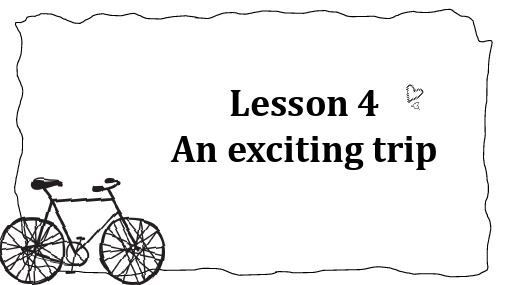
5. centre n. 中心,中央 (美语写作center) shopping centre 购物中心 in the centre of ...在...的中心
e.g. 在北京的中心 in the centre of Beijing
6. abroad adv. 在国外 be abroad 在国外 go abroad 去国外 live abroad 住在国外 (国外定居) travel abroad 在国外旅游 study abroad 国外学习
The doctor has saved over two hundred people’s lives so far. 到目前为止,这位医生已挽救了二百多人的生命。
用for 或since填空。
1. Jill has been in Ireland since Monday. 2. Jill has been in Ireland for three days.
否定句:主语+have/has not+过去分词+其它 He has not been to Australia.
疑问句:Have/Has+主语+过去分词+其它 Has he been to Australia?
三、现在完成时的时间状语
1. 现在完成时与不明确的过去时间状语副词before,just, already,yet,ever等连用。
• I have just received a letter from my brother, Tim. He is in Australia. He has been there for six months. Tim is an engineer. He is working for a big firm and he has already visited a great number of different places in Australia. He has just bought an Australian car and has gone to Alice springs, a small town in the centre of Australia. He will soon visit Darwin. From there, he will fly to Perth. My brother has never been abroad before, so he is fending this trip very exciting.
新概念英语第二册 lesson 4 笔记和答案
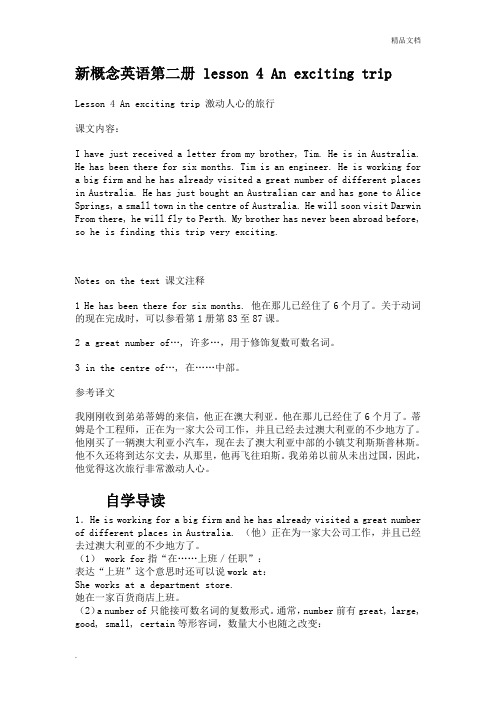
新概念英语第二册 lesson 4 An exciting trip Lesson 4 An exciting trip 激动人心的旅行课文内容:I have just received a letter from my brother, Tim. He is in Australia. He has been there for six months. Tim is an engineer. He is working for a big firm and he has already visited a great number of different places in Australia. He has just bought an Australian car and has gone to Alice Springs, a small town in the centre of Australia. He will soon visit Darwin From there, he will fly to Perth. My brother has never been abroad before, so he is finding this trip very exciting.Notes on the text 课文注释1 He has been there for six months. 他在那儿已经住了6个月了。
关于动词的现在完成时,可以参看第1册第83至87课。
2 a great number of…, 许多…,用于修饰复数可数名词。
3 in the centre of…, 在……中部。
参考译文我刚刚收到弟弟蒂姆的来信,他正在澳大利亚。
他在那儿已经住了6个月了。
蒂姆是个工程师,正在为一家大公司工作,并且已经去过澳大利亚的不少地方了。
他刚买了一辆澳大利亚小汽车,现在去了澳大利亚中部的小镇艾利斯斯普林斯。
裕兴 新概念英语 第二册 Lesson 4 第4课 笔记讲义
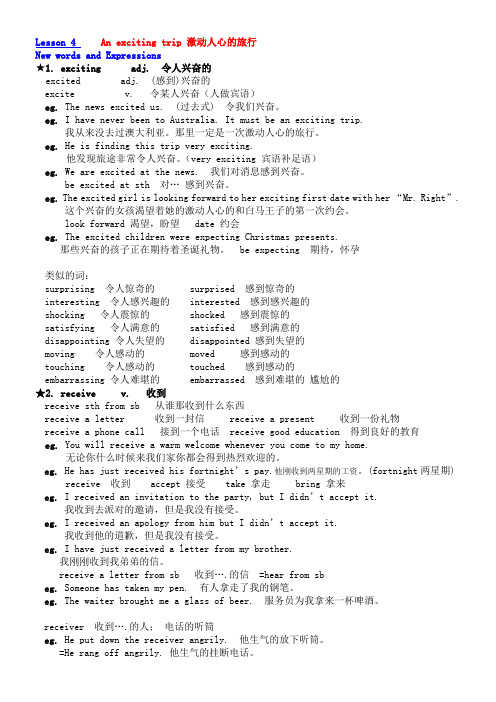
Lesson 4 An exciting trip 激动人心的旅行New words and Expressions★1. exciting adj. 令人兴奋的excited adj. (感到)兴奋的excite v. 令某人兴奋(人做宾语)eg. The news excited us. (过去式) 令我们兴奋。
eg. I have never been to Australia. It must be an exciting trip.我从来没去过澳大利亚。
那里一定是一次激动人心的旅行。
eg. He is finding this trip very exciting.他发现旅途非常令人兴奋。
(very exciting 宾语补足语)eg. We are excited at the news. 我们对消息感到兴奋。
be excited at sth 对…感到兴奋。
eg.The excited girl is looking forward to her exciting first date with her “Mr. Right”.这个兴奋的女孩渴望着她的激动人心的和白马王子的第一次约会。
look forward 渴望,盼望 date 约会eg. The excited children were expecting Christmas presents.那些兴奋的孩子正在期待着圣诞礼物。
be expecting 期待,怀孕类似的词:surprising 令人惊奇的 surprised 感到惊奇的interesting 令人感兴趣的 interested 感到感兴趣的shocking 令人震惊的 shocked 感到震惊的satisfying 令人满意的 satisfied 感到满意的disappointing 令人失望的 disappointed 感到失望的moving 令人感动的 moved 感到感动的touching 令人感动的 touched 感到感动的embarrassing 令人难堪的 embarrassed 感到难堪的尴尬的★2. receive v. 收到receive sth from sb 从谁那收到什么东西receive a letter 收到一封信 receive a present 收到一份礼物receive a phone call 接到一个电话 receive good education 得到良好的教育eg. You will receive a warm welcome whenever you come to my home.无论你什么时候来我们家你都会得到热烈欢迎的。
新概念英语第二册Lesson4课件
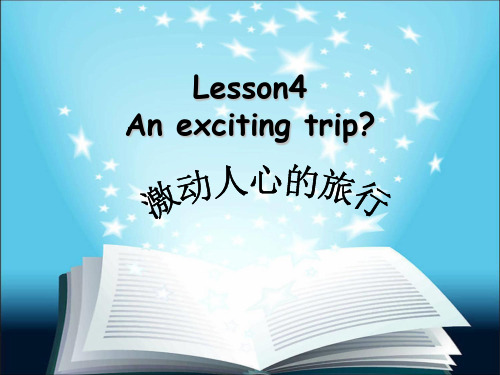
New words
firm n.商行,公司 law firm法律公司
公司
=company
different adj.不同的—— same相同的
adv. differently, n. difference
e.g. My coat is different from yours.
和…相同,一样
be the same with/as
--他们已经离开了,也就是说现在他们人不在这里
I have had my lunch.
--我已经吃过午饭了,也就是说我现在不饿
也可表示持续到现在的动作或状态。
He has learned English since 2001.
现在完成时与一般过去时的比较
1)一般过去时表示过去某时发生的动作或 单纯叙述过去的事情,强调动作;
yesterday.
6. There ___w_a__s(be) a telephone call for you just now. 7. When _d_i_d___ you _c_o__m__e(come) to China?
----Last year.
8. Yesterday I _t_h_o_u__g_h__t (think) that you were not in
现在完成时为过去发生的,强调过去的 事情对现在的影响,强调的是影响。
I saw this film yesterday. (强调看的动作发生过了。) I have seen this film. (强调对现在的影响,电影的内容已经知道 了。)
Grammar
2一般过去时常与具体的表示过去的时间状语连用; 现在完成时通常与模糊时间状语连用或无时间状语。
新概念英语第二册Lesson4(共49张PPT)
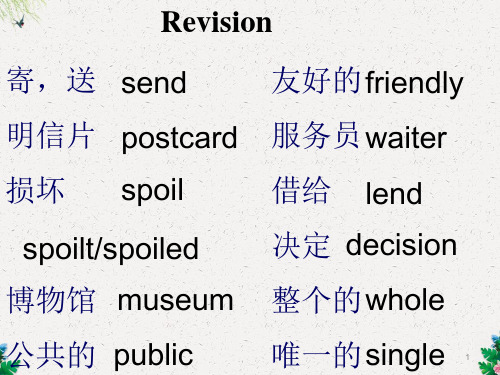
He lived abroad for many years. 你出国度假吗?
9
■different adj.不同的—— same相同的
(1)不同的,相异的(经常与from连用): be different from...与…不同 Desks are different from tables.
My plan/idea is different from yours.
We are planning something different this year. (2)各种各样的,不同的:
He has visited many different places in China. 他去过中国的不少地方。
This department store sells a large number of different things.
这家百货商店出售许多各种各样的东西。
adv. differently, n. difference
3
【辨】 exciting, thrilling ['θrɪlɪŋ] exciting 通常来形容让人很激动的人或事; thrilling 用来形容让人激动或害怕的发抖、令
人难以控制情绪的事
-ed自己感到 interested, bored, -ing令人感到interesting,boring, I am interested in this book. This is an interesting book.
Revision
寄,送 send 明信片 postcard 损坏 spoil
spoilt/spoiled 博物馆 museum
新概念英语第二册第四课 lesson 4 An exciting trip课件
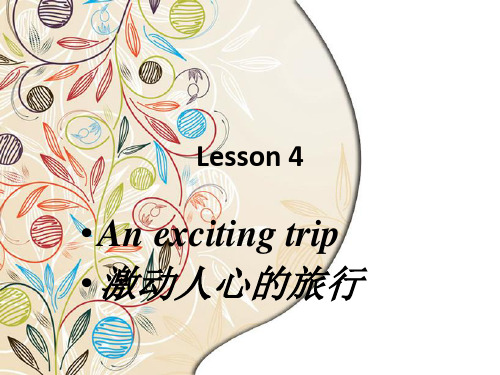
the Capital city : Canberra堪培拉
the famous city : Sydney 悉尼
Kangaroo袋鼠
sheep (one sixth); wool (one third )
Kola Bear :考拉熊
Important words
• exciting • receive • firm • different • centre • abroad
2021/4/7
区别用法:receive, accept, take
• 区别用法:receive, accept, take这三个词都 有“接受”的意思。
• receive(客观情况)只表示被动地接受
• Then he smiled and told me I would receive an extra £100 a year! 后来他笑了,并且告 诉我说,我将一年收到一百英镑的额外收 入!
2021/4/7
Ⅲ Text study
1. Firm公司=company, law firm factory工厂
2. a great number of =a great/g of 修饰不可数名词 a great/good deal of 可数/不可数名词
• Soon got, Soon gone. 来得容易去得快。
5. have been to +sp.去过
have gone to +sp.去了还未回来
• I have never been to Australia. • He has gone to Australia.
2021/4/7
7. 坐飞机 • fly to Australia • go to Australia by
新概念2 lesson4

• 3 Tim has been in Australia for six months.His brother hasn’t seen him____January. • (a) for (b) since (c) from (d) by • 4 He has just bought an Australian car.He bought one______. • (a) a short time ago (b) a long time ago • (c) last year (d) six months ago
请记忆~~~
钻石句型:
• I have just received a letter from my brother,Tim.(同位语) • receive sth. from sb. • receive(客观情况) • accept(主观愿望)
请记忆~~~
• He is working for a big firm and he has already visited a great number of different places in Australia. • work指抽象工作,不可数名词 • job指具体工作,可数名词 • works泛指作品,工程,工厂 • 大量,很多的表达方式: • many ;a lot of=lots of;a great number of=a great many
请记忆~~~
黄金语法:再议现在完成时
• 1“已完成”用法是动作或过程发生在说话之前某 个没有明确说出的过去时间,现在已经完成了, 并与现在的情况有联系。如: • I have just received a letter from my brother,Tim.
新概念英语第二册Lesson_4【Mike最最经典绝对绝密,内部经典精品核心资料】

主讲:Mike有兴趣的可以加我的QQ :290143015我们可以一起交流英语,互相学习,交流好的英语课件,交流好的英语口语!期待你的到来!Being Excellent Is What Never Dies-----MikeMike 更多资料在地址:/?busin ess&aid=6&un=wdeshouji#7欢迎大家下载、交流。
!开始学习吧!Mike 语法经典讲解词法部分完型填空考查内容语篇信息词汇手段语法手段逻辑手段复现同现替代省略顺序关系并列关系分指关系转折关系解释关系因果关系语法项目新概念英语第二册Lesson 4An exciting trip 主讲:MikeToday we’ll listen to a story about an exciting trip in Australia.KEY WORDS ANDEXPRESSIONSexcitinga.令人兴奋的receive a letter收到一封信firmn.公司a great number of许多differenta.不同的in the centre of在…中部abroad在国外Alice Springs 艾利斯·斯普林斯Darwin达尔文Perth珀斯Questions:How long has Tim been in Australia? What does he do in Australia?Why is Tim finding this trip exciting?Question 1:How long has Tim been in Australia?Question 2:What does he do in Australia?Question 3:Why is Tim finding this trip exciting?Answer :Tim has been in Australia for six months.Answer :He is working for a big firm as an engineer.Answer :Because Tim has never been abroad before.He is working for a big firm and he has already visited a great and he has already visited a great number of different places in Australia. He has just bought an firm = companywill fly to Perth. My brother has never been aboard before, so a great number of = a great many 【后跟可数名词复数】a great amount of 【后跟不可数名词,如money 】I have just received a letter from my brother, Tim. He is inhe is finding this trip very exciting.have been to someplace 已经去过某地(可能已回)have gone to someplace 已经去了某地(不在此地)Abroad 作为副词,可用于以下词的后面:be / go / study / travel / liveAustralia. He has been there for six months. Tim is an engineer. He is working for a big firm and he has already visited a great number of different places in Australia. He has just bought an Australian car and has gone to Alice Springs, a small town in the centre of Australia. He will soon visit Darwin. From there, he will fly to Perth. My brother has never been aboard before, so he is finding this trip very exciting .find+名词+形容词:觉得…怎么样I find this book very interesting.Did you find this movie boring?take a trip to…I am planning to take a trip to Tibet.★语法I have just received a letter from my brother, Tim. He is in Australia. He has been there for six months. Tim is an engineer. He is working for a big firm and he has already visited a great number of different places in Australia. He has just bought an Australian car and has gone to Alice Springs, a visit Darwin. From there, he will fly to Perth. My brother has never been aboard before, so he is I have just received a letter from my brother, Tim.He has been there for six he has already visited a great number of He has just bought an Australian car and has gone to Alice Springs brother has never been aboard before I have just received a letter from my brother, Tim.He is in Australia. He has been there for sixmonths.Tim is an engineer. He is working for a big firm and he has already visited a great number of different places in Australia.He has just bought an Australian car and has gone to Alice Springs , a small town in the centre of Australia. He will soon visit Darwin. From there, he will fly to Perth. My brother has never been aboard before , so he is finding this trip very exciting.现在完成时表示当前已经完成的动作,其基本句型结构为:have/has+过去分词I have just received a letter from my brother, Tim.He has been there for six months .He has already visited a great number of different places in Australia.My brother has never been abroad before .Have you ever been to the United States?I haven’t been very successful so far .The train has not arrived yet .I haven’t heard from him since 2008.语法重点掌握:just、already、yetI have just received a letter from my brother, Tim.He has just finished his homework.My mother has just bought a new hat.I have already made up my mind.She has already finished her housework.My father has already arrived there.I have not received my pen pal’s letter yet.She has not seen the famous singer yet.His brother has not been to Beijing yet.Have you read this book yet?Has he bought the mobile phone yet?Have they won the game yet?Homework:请用以上三个词分别造两个现在完成时的句子,完成后发送到E-mail:cothy20@,请在文档中注明学生姓名。
新概念2lesson4

The fourth lesson No wrong numbersName __________DateNew words and expressionspigeon n. 鸽子message n. 信息cover v . 越过distance n. 距离,请求request n. 要求spare part 备件service n. 业务,服务Questions1、Where has Mr. Scott opened his second garage?2、Where is his first garage?3、How far away is Silbury?4、Can Mr. Scott get a telephone for his new garage or not?No wrong numbers Mr. James Scott has a garage in Silbury and now he has just bought another garage in Pinhurst. Pinhurst is only five miles from Silbury, but Mr. Scott cannot get a telephone for his new garage, so he has just bought twelve pigeons. Yesterday, a pigeon carried the first message from Pinhurst to Silbury. The bird covered the distance in three minutes. Up to now, Mr. Scott has sent a great many requests for spare parts and other urgent messages from one garage to the other. In this way, he has begun his own private 'telephone' service.5、What has he bought?6、In how many minutes do they carry messages from one garage to the other? Comprehension1 Mr. Scott hasn't got a telephone in his new garage because _________(a) it isn't far from his old garage, so he doesn't need one (b) he has twelve pigeons(c) he can't get one (d) it's too expensive2 Mr. Scott keeps pigeons because __________(a) he uses them to send messages (b) it's his hobby(c) he has two garages (d) he likes them Structure3 Mr. Scott has a garage. The garage is ________(a) to him (b)of him (c) of his (d) his4 Mr. Scott cannot get a telephone for his garage. _________he has just bought twelve pigeons.(a) That's so (b) That's why (c) Because (d) For5 He has just bought twelve pigeons. When did he _________ them?(a) bought (b) buys (c) buy (d) buying6 What's the distance from Pinhurst to Silbury? How ______ is Pinhurst ___ Silbury?(a) long ago ... until (b) long ... away (c) away ... till (d) far ... from7 The pigeon flew from one garage to the other ________ three minutes.(a) in (b) into (c) with (d) onV ocabulary8 Mr. Scott has a garage in Silbury. His ________ garage is in Pinhurst.(a) another (b) other (c) else (d) different9 Mr. Scott can't get a telephone. Te1ephones are hard to ________(a) take (b) receive (c) obtain (d) find10 He has sent requests for spare parts. He has __________ spare parts.(a) asked (b) asked for (c) begged (d) pleased11 Urgent messages are important, so they must be sent ________(a) quickly (b) slow1y (c) by hand (d) largely12 Mr. Scott' s 'telephone service' is private. It is _________(a) general (b) spare (c) secret (d) his own Structures and usage现在完成时与一般过去时的区别1)过去时表示过去某时发生的动作或单纯叙述过去的事情,强调动作;现在完成时为过去发生的,强调过去的事情对现在的影响,强调的是影响。
(完整版)新概念英语第二册lesson-4(含课文、练习)
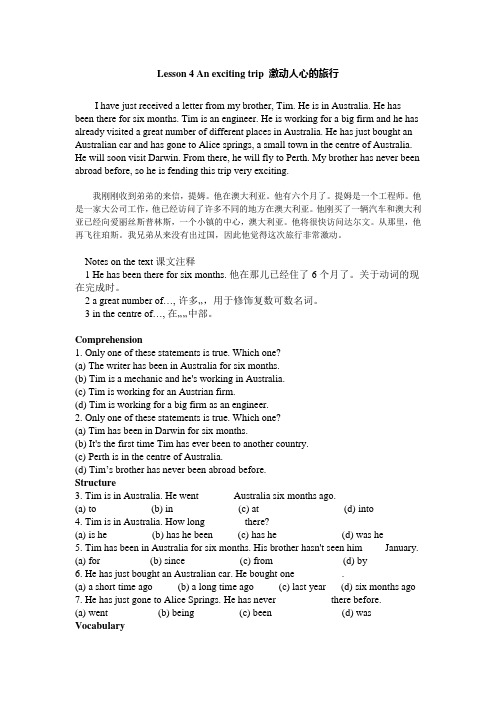
Lesson 4 An exciting trip 激动人心的旅行I have just received a letter from my brother, Tim. He is in Australia. He has been there for six months. Tim is an engineer. He is working for a big firm and he has already visited a great number of different places in Australia. He has just bought an Australian car and has gone to Alice springs, a small town in the centre of Australia. He will soon visit Darwin. From there, he will fly to Perth. My brother has never been abroad before, so he is fending this trip very exciting.我刚刚收到弟弟的来信,提姆。
他在澳大利亚。
他有六个月了。
提姆是一个工程师。
他是一家大公司工作,他已经访问了许多不同的地方在澳大利亚。
他刚买了一辆汽车和澳大利亚已经向爱丽丝斯普林斯,一个小镇的中心,澳大利亚。
他将很快访问达尔文。
从那里,他再飞往珀斯。
我兄弟从来没有出过国,因此他觉得这次旅行非常激动。
Notes on the text 课文注释1 He has been there for six months. 他在那儿已经住了6个月了。
关于动词的现在完成时。
2 a great number of…, 许多…,用于修饰复数可数名词。
3 in the centre of…, 在……中部。
新概念英语第二册Lesson4课件(共25张PPT)
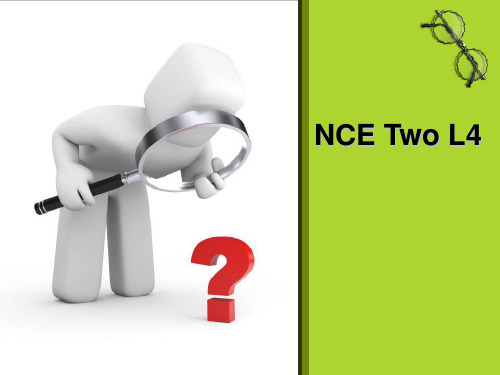
D.the same size as a village
Choose.
( C )11.He will soon visit Darwin. He will
visit Darwin _____.
A.quickly
B.for a short time
C.shortly
D.in a hurry
(C )12.He will fly to Perth. He will go
in the centre of Australia. He will soon ___v_is_i_t__(visit)7 Darwin. From there, he will __f_ly__t_o____(fly to)8 Perth. My brother has never been abroad before, so he is finding this trip very _in__t_e_r_e_s_t_i_n_g_
( B )4.-Have you ever _____ to Haikou? -Yes, I ____ there with my family
last August.(11海南) A.gone, went B.been, went C.been, went to D.been, was in
Thank you!
be different from difference the same
Translate.
1.我的房间与你的不同。 2.他们住在同一层楼。 3.How many differences can
you find?
abroad 国外
[əˈbrɔ:d ]
adv.
Translate.
新概念二Lesson 4 An Exciting Trip最全知识点总结
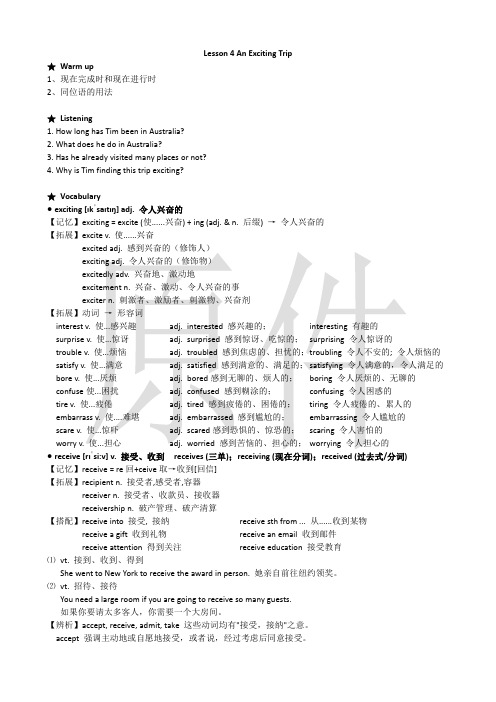
Lesson4An Exciting Trip★Warm up1、现在完成时和现在进行时2、同位语的用法★Listening1.How long has Tim been in Australia?2.What does he do in Australia?3.Has he already visited many places or not?4.Why is Tim finding this trip exciting?★Vocabulary●exciting[ɪkˈsaɪtɪŋ]adj.令人兴奋的【记忆】exciting=excite(使......兴奋)+ing(adj.&n.后缀)→令人兴奋的【拓展】excite v.使......兴奋excited adj.感到兴奋的(修饰人)exciting adj.令人兴奋的(修饰物)excitedly adv.兴奋地、激动地excitement n.兴奋、激动、令人兴奋的事exciter n.刺激者、激励者、刺激物、兴奋剂【拓展】动词→形容词interest v.使...感兴趣adj.interested感兴趣的;interesting有趣的surprise v.使...惊讶adj.surprised感到惊讶、吃惊的;surprising令人惊讶的trouble v.使...烦恼adj.troubled感到焦虑的、担忧的;troubling令人不安的;令人烦恼的satisfy v.使...满意adj.satisfied感到满意的、满足的;satisfying令人满意的,令人满足的bore v.使...厌烦adj.bored感到无聊的、烦人的;boring令人厌烦的、无聊的confuse使...困扰adj.confused感到糊涂的;confusing令人困惑的tire v.使...疲倦adj.tired感到疲倦的、困倦的;tiring令人疲倦的、累人的embarrass v.使....难堪adj.embarrassed感到尴尬的;embarrassing令人尴尬的scare v.使...惊吓adj.scared感到恐惧的、惊恐的;scaring令人害怕的worry v.使...担心adj.worried感到苦恼的、担心的;worrying令人担心的●receive[rɪˈsi:v]v.接受、收到receives(三单);receiving(现在分词);received(过去式/分词)【记忆】receive=re回+ceive取→收到[回信]【拓展】recipient n.接受者,感受者,容器receiver n.接受者、收款员、接收器receivership n.破产管理、破产清算【搭配】receive into接受,接纳receive sth from...从......收到某物receive a gift收到礼物receive an email收到邮件receive attention得到关注receive education接受教育⑴vt.接到、收到、得到She went to New York to receive the award in person.她亲自前往纽约领奖。
新概念 第二册 Lesson 4 An exciting trip (自带课文视频和听力)
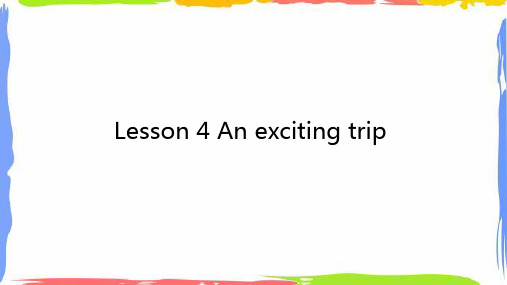
3. He has been there for six months.
have been there 表示___待__在__那__里__
4. Tim is an engineer. He is working for a big firm and he has already visited a great number of different places in Australia.
5. centre adj. 中心 = __c_e_n_t_e_r_ (AmE)
词组:购物中心 _s_h_o_p_p__in_g__c_e_n__te__r_
翻译:人民广场在上海市中心。 P__e_o_p_l_e_’_s_S_q_u__a_r_e_i_s_i_n__th__e_c_e_n__te__r _o_f S__h_a_n_g_h__a_i.___
词组:work for __为__…__…__工__作______ work in ___在__某__地__工__作_____ work as ___表__示__职__业_______
He worked _f_o_r_/__in__ a middle school. He worked ___a__s___ a teacher in a middle school.
6. abroad adv. 在国外
词组:出国留学 _s_t_u_d_y__a_b_r_o_a_d_____ 出国旅行 _t_r_a_v_e_l_a_b_r_o_a__d____
形近词:go aboard ___上_船__;__上__飞__机_____
Reading comprehension
翻译: 我们刚刚寄掉这些明信片。 _W__e__h_a_v_e__ju__s_t _s_e_n_t_t_h_e__s_e_p__o_s_tc_a__rd__s.__ 他已经把所有词典都借给你了。 _H_e__h_a_s__a_lr_e_a_d_y__l_e_n_t_a_l_l_h_i_s_d__ic_t_io__n_a_r_ie_s__t_o__y_o_u. 我之前从未见过你。 _I_h_a__v_e_n__e_v_e_r_s_e_e_n__y_o__u_b__e_fo__re__. _
- 1、下载文档前请自行甄别文档内容的完整性,平台不提供额外的编辑、内容补充、找答案等附加服务。
- 2、"仅部分预览"的文档,不可在线预览部分如存在完整性等问题,可反馈申请退款(可完整预览的文档不适用该条件!)。
- 3、如文档侵犯您的权益,请联系客服反馈,我们会尽快为您处理(人工客服工作时间:9:00-18:30)。
3. I (took) (received) ———— the letter with me. ———— some flowers 4. He has (taken) (received) to her. ———— (take) this book 5. Why did you (receive) off the shelf.
E Read these two sentences. I've already had lunch. Have you had lunch yet? Ask questions in the same way. 1. I've already seen the new play at ‘The Globe’. Have you seen the new play at ‘The Globe’ yet
4. Where is he?
He is in Australia.
5. How long has he been there? He has been there for six months. 6. What’s his job?He is an engineer.
No ,he isn’t. 7. Isn’t he a mechanic?
He has just bought an Australian car and has gone to Alice Springs, a small town in the centre of Australia. He will soon visit Darwin. From there, he will fly to Perth. My brother has never been abroad before, so he is finding this trip very exciting.
3)表示经历 → 过去所为,对现在来说有了 人生的经历。 我去过长城。I’ve been to the Great Wall. 4) 特殊用法 ① 代替现在完成进行时 我已经开车6个小时了。 I have driven for six hours.
② 与一般将来时搭配,表示将来完成 我一做完这件事,就会给你打电话的。 I’ll call you when I’ve done this. 过去分词的变化规则 与过去式相同。
这条新闻让人(我)激动。 The news is exciting. The news excites me. I am excited at the news. interest (v.)+sb. 使某人感兴趣 interesting 有趣的 interested (in) 感到有趣的
receive
1. He is leaving the house. He has just left the house. 2. He is having breakfast. He has just had breakfast. 3. She is writing a letter. She has just written a letter.
Text
I have just received a letter from my brother, Tim. He is in Australia. He has been there for six months. Tim is an engineer. He is working for a big firm and he has already visited a great number of different places in Australian.
abroad
adv.
在国外(直接与动词连用)
留学 study abroad
出国 go abroad
Grammarቤተ መጻሕፍቲ ባይዱ
1. 现在完成时 have/has + v.过去分词 1)表示持续 → 动作过去开始到现在为止。 今年夏天很热。 It has been hot this summer. 2)表示结果 → 过去实施对现在有影响。 夏天到了。The summer has come. (夏天已至)
D Read these two statements. He is still having breakfast. He hasn't had breakfast yet. Complete the following in the same way. 1. He is still washing the dishes. He hasn't washed the dishes yet.
Receive and Take.
Choose the correct words in the following. —— (received) a present 1. Yesterday I (took) from Aunt Jane. ——— (received) a letter from 2. Have you (taken) him yet.
Exercises
A Write these sentences again. Put the words n parentheses in the right place. 1. I have had breakfast. (just) I have just had breakfast. 2. He has been in prison.(for six months) He has been in prison for six months.
8. I haven't seen George.(lately) I haven't seen George lately.
C What is happening? What has happen? Read these two statements. The bell is ringing. The bell has just rung. Complete the following in the same way.
Often-used phrases
1. Have you just received a letter? Yes , I have.
2. Was it from your sister or your brother? It was from my brother. 3. Is he in Austria? No , he isn’t.
exciting
adj. 令人兴奋的 (修饰 sth.)
excited adj. 感到激动的 (sb. 做主语) excite v. 使激动(+ sb. 作宾语) 某物使某人感到兴奋 sth. be exciting / sth. excites sb. sb. be excited at sth.
2. I've already taken my holidays. Have you taken your holidays yet? 3. I've already read this book. Have you read this book yet? 4. I've already done my homework. Have you done your homework yet? 5. I've already finished my work. Have you finished your work yet?
2. She is still making the beds. She hasn't made the beds yet. 3. He is still combing his hair. He hasn’t combed his hair yet. 4. She is still sweeping the carpet. She hasn’t swept the carpet yet. 5. We are still reading ‘Macbeth’. We haven’t read ‘Macbeth’ yet.
8. Who is he working for? He is working for a big firm.
9. Has he travelled in Australia yet? Yes, he has.
10. What’s he just bought? He’s just bought an Australian car. 11. Where has he gone in it? He has gone to Alice Springs. 12. It is a big town, isn’t it?No , it isn’t.
Lesson 4 An exciting trip 激动人心的旅行
Words
exciting /ik 'saitiŋ / adj. 令人兴奋的 receive /ri 'si:v/ v. 接受,收到 firm /fə :m/ n. 商行,公司 different / 'difərənt/ adj. 不同的 centre / 'sentə/ n. 中心 abroad /ə 'brɔ :d/ adv. 在国外
5. Have you been to Switzerland?(ever) Have you ever been to Switzerland?
6. I have been to Switzerland.(never) I have never been to Switzerland.
7. He is a wonderful runner. He has broken two records.(so far) He is a wonderful runner. He has broken two records so far.
